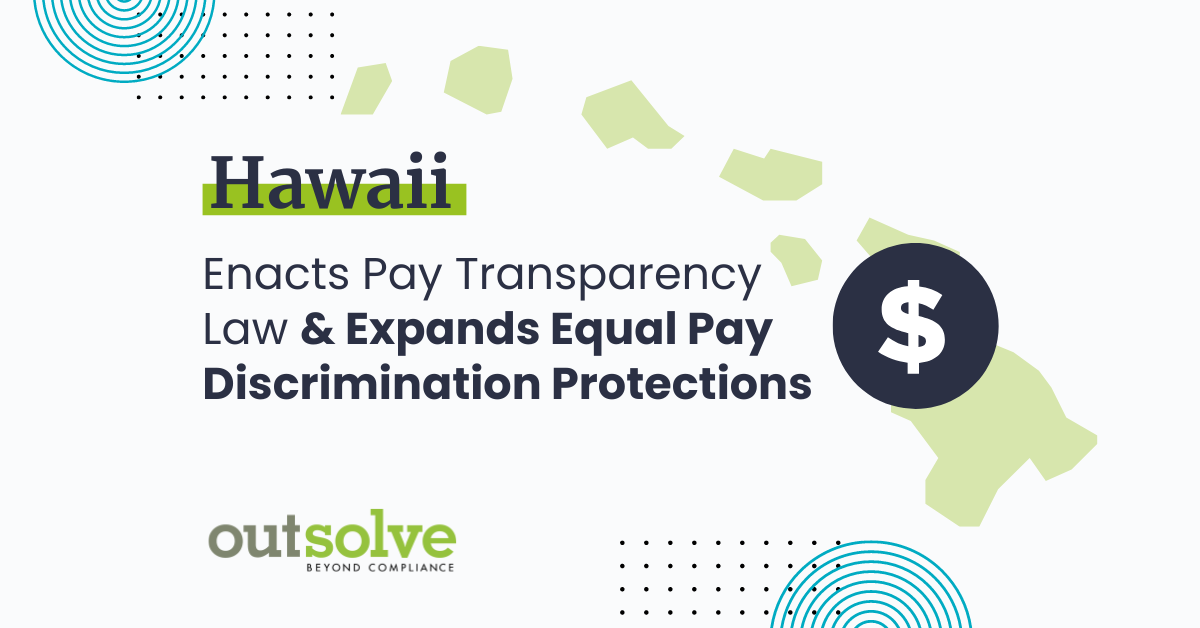1 min read
Hawaii Enacts Pay Transparency Law and Expands Equal Pay Protections
![]() OutSolve
:
Jul 14, 2023 12:33:33 PM
OutSolve
:
Jul 14, 2023 12:33:33 PM

Hawaii is the latest state to require disclosure of wage or salary pay ranges in job listings.
On July 3, 2023, Governor Josh Green signed into law, SB 1057, which requires employers to “disclose an hourly rate or salary range that reasonably reflects the actual expected compensation” in job listings. It also expands the state’s equal pay discrimination protections by prohibiting employers from discriminating based on “any protected category” identified by state law, not just “sex,” by paying such employees less for “substantially similar work.”
When the law becomes effective on January 1, 2024, employees may bring claims of pay discrimination based on race, sex, gender, age, religion, and other bases. Instead of tracking side by side with the federal Equal Pay Act, this law follows states like California and New York replacing “substantially similar work” from the “equal work” standard.
The bill was proposed to “reduce pay inequities” by increasing pay transparency and prohibiting pay discrimination for substantially similar work.
Exclusions include:
- Companies with fewer than 50 employees
- Internal transfers or promotions within an employer
- Public employee positions for which salary, benefits, or other compensation are determined through collective bargaining
While the bill does not contain specific enforcement provisions, Hawaii law allows aggrieved victims of alleged discrimination to file a complaint with the Hawaii Civil Rights Commission. Individuals also have a private right of action under state law.
%20(1).png?width=300&height=80&name=OutSolves%20Take%20(300%20%C3%97%2080%20px)%20(1).png)
Hawaii employers should review their recruiting policies and make changes to comply with the job listing requirements by January 1, 2024. What sets the Hawaii pay transparency law apart from other states is its noted exceptions, particularly excluding internal job postings for transfers or promotions. Employers should review the practical implications of adding pay information to job postings and alerting HR employees of the requirements of the law.
The bill is unclear on requirements for remote workers, how to count employees to meet that 50 plus threshold and does not define “hourly rate” or “salary range” leaving up to the employer’s interpretation until further guidance is provided.
Additional information on recent changes to pay equity laws can be accessed here: Pay Equity Law Update 2023.
To take a proactive view of pay equity efforts, we recommend you regularly evaluate your pay practices to identify and remedy any disparities. Pay Equity Analysis Services or other compliance services are available to assist you. OutSolve can be reached at info@outsolve.com or by calling 888-414-2410.
Founded in 1998, OutSolve has evolved into a premier compliance-driven HR advisory firm, leveraging deep expertise to simplify complex regulatory landscapes for businesses of all sizes. With a comprehensive suite of solutions encompassing HR compliance, workforce analytics, and risk mitigation consulting, OutSolve empowers organizations to navigate the intricate world of employment regulations with confidence.
Recent Posts
Related Posts

The Ultimate Guide to Multi-State Labor Law Posters
Human Resources professionals understand how important and challenging it can be to remain updated and compliant with labor laws. This is especially...

Countdown: Final Days of the 90-Day Safe Harbor Period for AAPs
April is here and with that comes the end of the 90-day safe harbor period for federal contractors complying with EO 11246. As April 21, 2025,...

What Triggers an I-9 Audit? Key Factors You Should Know
Verifying proper identity and work authorization documentation for every employee is a crucial HR compliance function - not just for a company’s...


